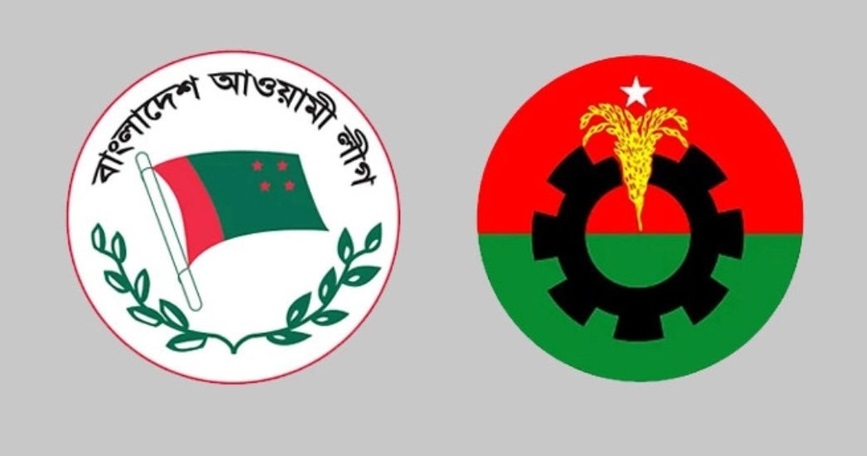
27 October, 2023 13:37

The politics of the country revolves around specific dates, with the BNP announcing the commencement of the 'Maha Yatra of Movement' on October 28. This Mahayatra, according to them, will lead to the resignation of the government. Simultaneously, the Awami League is also planning a 'Maha Yatra' on the same date, aiming to continue the 'Maha Yatra of Development.' Unfortunately, the citizens find themselves caught in the turmoil caused by these separate 'Maha Yatras' conducted by the two parties.
Presently, all focus is on the movement towards Dhaka, as the objective is to seize control of the center. The BNP's sole focus is the resignation of the government—they do not have any other agenda at the moment. Although their demands were previously supported by the caretaker government, such support is no longer apparent. Consequently, the BNP has centered all its efforts on demanding the government's resignation. However, their demands have surpassed the context of the parliament's five-year term and BNP's political program.
It is imperative to consider the consequences if the government were to resign as per the BNP's demand. Who would assume responsibility in such a scenario? How would the issue of constitutional ambiguity be resolved? Astonishingly, there are no definitive answers. Therefore, one cannot disregard that the BNP's demand is pushing for a severe constitutional crisis. This predicament begs the question of what the people should do under such difficult circumstances.
It is worth mentioning that the general populace does not thoroughly analyze the demands made by political parties. Often, they neglect to consider the underlying motives behind these assertions. Due to either a lack of analytical abilities or a reluctance to analyze, the demands put forth by political parties frequently lean toward the illogical rather than the logical. The BNP's single-minded demand of government resignation contradicts the tenets of the constitution and, instead, poses a threat by advocating for an unelected government coming to power.
Furthermore, the BNP's demand does not account for the subsequent election. Their focus remains solely on the resignation of the government. As per the constitution, the parliament dissolves upon the prime minister's resignation—this is what they demand. Consequently, one must inquire who would lead the interim government in such a circumstance. Would the country be left without a government? The notion of not participating in elections under a party government is untenable within the confines of the existing system. If the reestablishment of a caretaker government system is desired, it falls to the Parliament to take the necessary steps. It is puzzling why the BNP, based on its own prior experiences, is failing to comprehend this shared issue.
How can BNP overlook the fact that prior to the June 12, 1996 elections, the one-party system held elections on February 15 of the same year? The impartiality in our country is scarce, except for the irrational and the young. BNP was compelled to incorporate the caretaker government system into the constitution, even after comments made by the then Prime Minister, Begum Khaleda Zia. The caretaker system was eventually approved by Parliament, after a midnight session that lasted until the early hours, as executive orders were not sufficient. It was evident that the election system required parliamentary decision-making. Bypassing Parliament was not an option. However, the BNP government seems to have forgotten this. The current situation demands that Parliament reintegrate the caretaker government system into the constitution and allow the government to remain until that time. Therefore, there is no valid reason for the government to resign. It can be argued that the BNP's movement revolves around unnecessary demands.
The ongoing session of the 11th Parliament is nearing its conclusion. The session, initiated on October 22, is expected to end on November 2. According to the Election Commission's announcement, the twelfth parliamentary elections are scheduled for the second week of November. These elections are constitutionally mandated, and the likelihood of them being postponed is minimal. If the upcoming parliamentary elections proceed under the existing constitutional framework, the government will not be required to resign, and Parliament will not be dissolved. None of BNP's claims align with this scenario. If their demands were to be accepted, a bill addressing the electoral system would need to be introduced in Parliament and subsequently passed.
BNP has set October 28 as the focal point of their program. Their speeches, campaigns, and preparations all revolve around this particular date. Transportation might pose an initial obstacle as leaders and activists from across the country have already started making their way to Dhaka, with more arriving daily. The aim is to gather a large crowd, which is expected to materialize. Leaders and activists at every level within the party hold the belief that something significant will occur on the 28th! Despite having set multiple dates in the past, with no success in toppling the government, BNP leaders and activists remain hopeful. This includes previously designated dates such as December 10 of last year and July 28-29 of this year.
While attempting to overthrow a government based on a specific date may seem ludicrous, it is not without precedent. In 2004, the former General Secretary of the Awami League, late Abdul Jalil, predicted that Khaleda Zia would fall on April 30. This prediction, known as "Jalil's ultimatum," has since become a humorous episode in the country's history. In 2013, leaders of Hefazet Islam also made similar declarations against the Awami League government. Late Hefazat leader Junaid Babunagari warned that the country would operate in accordance with their demands, following a massive rally at Shapla Chattar in the capital on May 5. Last year, BNP leader Amanullah Aman announced December 10 (2022) as the date when Begum Khaleda Zia and Tareque Zia would govern the country. However, it is important to recognize that the fall of a government based on a specific date has never occurred before, and it seems unlikely that it will happen this time either.
Will October 28 become another date like the ones before it? It is difficult to say, but anything compromising public safety is possible. Despite past failures, BNP believes that America and the Western world stand behind them. Mirza Fakhrul Islam Alamgir, the party's Secretary General, has said, "What we achieved in 2014 and 2018 cannot be replicated in the 2023 elections. The Western powers are providing us with encouragement that cannot be denied." BNP Vice Chairman Barrister Shahjahan Omar stated, "American Ambassador Peter Haas has become our guardian angel. Father, save and protect us! He should proclaim, 'I stand with you. We are both democratic nations.' Peter Haas, Father God, Assalamu Alaikum."
According to the beliefs and statements of BNP leaders and workers at all levels, this date and movement represent more than just a political program. In response to this situation, the ruling party, Awami League, has announced its own separate program. Police and other law enforcement agencies are preparing to maintain law and order.
The participation of ordinary citizens in political programs has waned. People have come to understand that these programs are solely designed to gain and retain power. While some loyal activists partake, the majority of participants consist of "hired political workers." These groups hold the entire country hostage to further their own interests, thereby jeopardizing public safety.
আপনার মন্তব্য